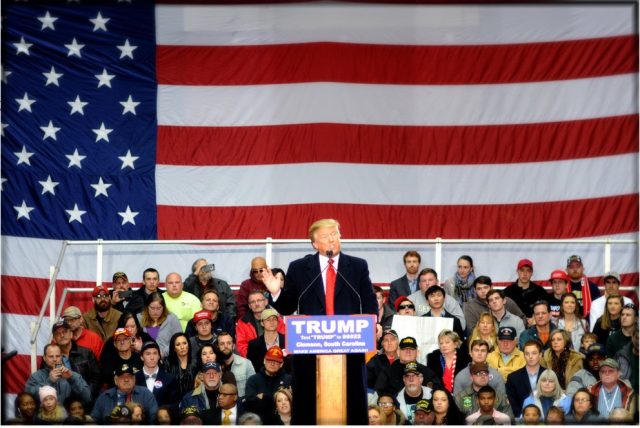
US space policy has been anything but a prominent issue in the 2016 presidential election, falling far behind domestic and foreign policy issues, not to mention normal campaign antics like name-calling. Yet NASA consumes about 0.5 percent of the federal budget and about 2 percent of federal discretionary spending. Therefore, while NASA may not come up much during the campaign, the agency may nonetheless see big changes under a new president who reassesses how the government is spending its money.
Unfortunately we don't have much detail about what the likely Democratic and Republican nominees for president will do in terms of space policy. There have been a few passing references on the campaign trail. For example, Hillary Clinton said she "really, really" does support the space program. And Donald Trump, in response to a question about NASA's plan to go to Mars, said, “I love NASA” and “Space is terrific.” However, he then added, “Right now, we have bigger problems. You understand that? We’ve got to fix our potholes.”The American Institute of Aeronautics and Astronautics understandably sought deeper insight than this, and so it sent a list of 10 questions to Bernie Sanders and Hillary Clinton on the Democratic side, and Donald Trump, Ted Cruz, and John Kasich on the Republican side. Only Sanders and Trump replied substantively to the questions, and because Sanders appears unlikely to be the Democratic nominee, we will focus on Trump's comments.
His reply can legitimately be described as thoughtful but does not bode well for NASA's troubled Journey to Mars program, which the agency talks about extensively but lacks a commitment from President Obama or Congress to carry out. Asked specifically about this plan, Trump replied, "A lot of what my administration would recommend depends on our economic state. If we are growing with all of our people employed and our military readiness back to acceptable levels, then we can take a look at the timeline for sending more people into space."
As Ars has reported, NASA's Journey to Mars will be stuck on Earth unless the White House and Congress step up to expand funding for its exploration programs. Trump does not seem amenable to maintaining a grand goal for Mars without the available funding. "What we spend in NASA should be appropriate for what we are asking them to do," he said.
These comments echo the sentiment expressed in the blue-ribbon Augustine commission, which reviewed NASA's human spaceflight plans in 2009 and concluded that more than anything, NASA should be given clear goals and funding commensurate to meet them. Instead of giving NASA a sustainable plan, the White House and Congress told the agency to build an expensive large rocket and space capsule to undertake an unprecedented Mars trip. NASA, of course, did not actually receive the funds it needed for such a mission.A Trump presidency, then, might seek to align NASA's goals more closely to its funding levels, which probably means scaling back those Mars ambitions. "We also have to balance our spending priorities based on our economic circumstances, and right now, those circumstances are quite challenging," he said. "Our first priority is to restore a strong economic base to this country. Then, we can have a discussion about spending."
That might not be wholly bad for NASA, as many outside experts have been encouraging the space agency to abandon its improperly funded Journey to Mars and re-calibrate its exploration goals by relying more on private space companies that are showing the ability to design, build, and fly rockets and spacecraft at a fraction of the cost of NASA's traditional contracting process. Trump sees a "tremendous overlap" between the interests of NASA and private space companies and says, "I think there needs to be a growing partnership between the government and the private sector as we continue to explore space."
reader comments
384